Lilith Blu-ray Movie
HomeLilith Blu-ray Movie 
Mill Creek Entertainment | 1964 | 115 min | Not rated | No Release Date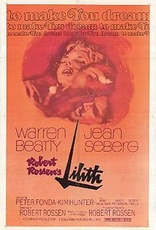
Price
Movie rating
6.7 | / 10 |
Blu-ray rating
| Users | 0.0 | |
| Reviewer | 2.5 | |
| Overall | 2.5 |
Overview
Lilith (1964)
A veteran returns to his bleak Maryland hometown and takes a job as an occupational therapist at Poplar Lodge, a private mental institution for the wealthy, where he cares for and falls in love with the beautiful and enigmatic Lilith.
Starring: Warren Beatty, Jean Seberg, Peter Fonda, Kim Hunter, Anne MeachamDirector: Robert Rossen
| Drama | 100% |
Specifications
Video
Video codec: MPEG-4 AVC
Video resolution: 1080p
Aspect ratio: 1.85:1
Original aspect ratio: 1.85:1
Audio
English: DTS-HD Master Audio 2.0
Subtitles
English SDH
Discs
50GB Blu-ray Disc
Single disc (1 BD)
Playback
Region A (B, C untested)
Review
Rating summary
| Movie | 2.5 | |
| Video | 2.5 | |
| Audio | 3.0 | |
| Extras | 0.0 | |
| Overall | 2.5 |
Lilith Blu-ray Movie Review
Committed
Reviewed by Michael Reuben April 10, 2013Lilith was director Robert Rossen's last film, and its reception by critics and audiences was the exact opposite from that of Rossen's previous film, The Hustler, which everyone loved and is now regarded as a classic. No one liked Lilith, despite the presence of glamorous stars Warren Beatty and Jean Seberg, who is said to have regarded the film as her favorite among her performances (and this was the actress who made Breathless for Godard). Far from becoming a classic, Lilith is almost forgotten today: barely seen, seldom discussed and stubbornly resistant to easy consumption, despite attempts to decipher it by reference to Rossen's troubles with the House Un-American Activities Committee (HUAC), which has too often served as a "key to all mythologies" for writers, playwrights and directors of the era. Lilith might be easier to take in, if it were an obscure subtitled foreign film starring an unfamiliar young man with an ordinary face instead of Beatty in his pretty boy youth. Despite the Maryland setting taken directly from J.R. Salamanca's novel, the film plays out in a surreal universe that resembles no tangible neighborhood anywhere in America. This sense of detachment from reality doesn't just result from the story's setting among patients at a mental asylum. It persists even when characters leave the grounds to visit "normal" places. Despite Rossen's well-known preference for filming in a documentary style in real locations, his last film leaves the overwhelming sense of the world dissolving and flowing through one's fingers. (Water imagery recurs throughout.) Oddball films like Lilith are catnip to cineastes but poor stepchildren to the studios that own them, because they don't sell. Lilith is part of the catalog array that Sony licensed to Mill Creek, which has crammed it onto a double-feature disc with Stanley Kramer's Ship of Fools. The two films have little in common other than being mid-Sixties releases in black-and-white that have something to do with insanity. (The term "ship of fools" derives from a medieval allegory about madmen adrift on a ship.) But Kramer's film was showered with Oscar nominations, and it operates in an entirely different world of filmmaking. Like it or not, you know what it's about. Lilith remains a puzzle.
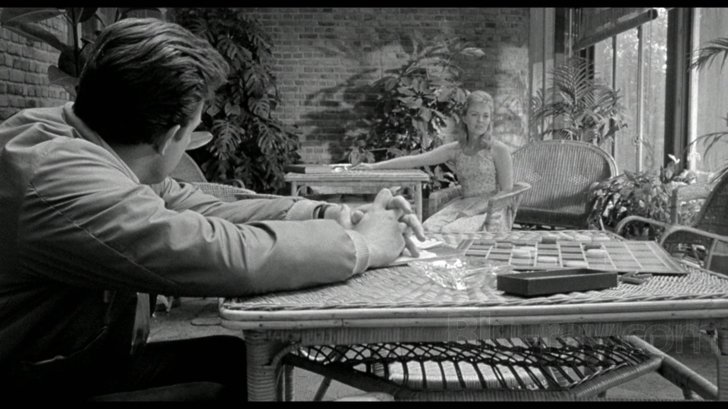
The title character, Lilith (Seberg), is a permanent patient at a psychiatric sanatorium called "Poplar Lodge" modeled on the Chestnut Lodge facility in Rockville, Maryland (which refused permission to film there), but the film is really about a young army veteran, Vincent Bruce (Beatty), who takes a job at Poplar Lodge as an occupational therapist or "OT". Vincent's background emerges in fragments throughout the film, and much of it remains a blank. When we first encounter him, he is walking through the gates of Poplar Lodge as if drawn there. Vincent is interviewed, given a tour and offered a job by Bea Brice (Kim Hunter, an Oscar winner for A Streetcar Named Desire). Her position is never specified. The patients call her "Miss", but IMDb lists her as "Dr." Confusion about who is who is a running theme in Lilith. During his "interview", Vincent says he grew up nearby and was always fascinated by the place. It gradually emerges that Vincent's mother suffered from some sort of mental condition, may have committed suicide and probably needed psychiatric treatment. However, Miss Brice makes it clear that the patients at Poplar Lodge are not likely to be cured. They are there because someone can afford to pay large sums to maintain them in comfortable and tranquil surroundings. After his interview, Vincent wanders into town, where he sees an old flame, Laura (Jessica Walter, in her first film). As is the case with most of Vincent's interactions, the conversation is awkward. Laura asks why he never answered her letters. He evades the question. She tells him that she's married now, because she couldn't wait for him forever. (Her boorish husband, whom Vincent meets later, is played by Gene Hackman in one of his earliest film roles.) Vincent's grandmother (Lucy Smith) doesn't want him to take the job at Poplar Lodge, but Vincent is surprisingly enthusiastic. The appeal may have something to do with Poplar Lodge's unique atmosphere—the unexpected outbursts, the uncontrolled laughter, the instantly familiar tone assumed by the patient who asked him about Dostoyevsky—and it may also have something to do with the beautiful blonde schizophrenic of whom Vincent caught a glimpse. She bears a striking resemblance to a photograph of his late mother. The bulk of Lilith nominally concerns a romantic triangle formed by Vincent, Lilith and another patient named Stephen (Peter Fonda). I say "nominally", because romantic relationships presuppose some form of connection, and it's hard to imagine characters as disconnected from each other as these three. Lilith has been diagnosed with schizophrenia, Stephen is shy but obsessive to the point of delusion, and Vincent is . . . well, much of the film can be viewed as a sustained inquiry into exactly what Vincent really is, and the question is still open at the end. But as he spends more time one-on-one with Lilith and invents ever more elaborate excuses to squire her on outings away from Poplar Lodge, Vincent throws out more clues about who he has been and who he has become. The film's depiction of mental illness and its treatment often seems artificial in an age when so much has been changed by advances in both neurochemistry and psychopharmacology. Part of the problem derives from the very real distinction (which still exists) between the quality of treatment available for those with wealth and those without. But Lilith also reflects a romanticized and, indeed, sanitized version of schizophrenia consistent with renegade psychiatric theories of the era that saw schizophrenics as individuals possessed of specially attuned "senses" granting them access to other planes of reality. Thus, Lilith is said to live in her own world and even invents her own language, of which we see a sample written on the wall of her room, but she still manages to maintain a semblance of normalcy in her dealings with Vincent and the rest of the staff. A typical schizophrenic is not so cooperative, as anyone who has ever dealt with one can attest. They are more likely to become unruly in response to imagined stimuli that the rest of us cannot perceive, like the patient Miss Glassman (Jeanne Barr), who routinely bursts into hysterical laughter for reasons not apparent to anyone else. Lilith is usually described as the story of Vincent being drawn into Lilith's world, but it could also be described in the opposite terms. The elaborate sequence in which the couple visits a Renaissance Fair and Vincent demonstrates his prowess in the modern version of jousting is a journey into a world that is peculiarly Vincent's, an earlier time where he felt safe and happy before something changed him into the hollowed-out soul he is today. And when Vincent uses his position as an OT to push away his rival, Stephen, is he doing Lilith's bidding or his own? One of the most unsettling aspects of Lilith's visual design is the inability to distinguish between patients and staff at Poplar Lodge, because they all dress equally well, and no one wears a uniform, a white coat or even a name badge. These details may well have been borrowed from Chestnut Lodge, but they remove any sense that the doctors and staff are there to help. At most, they appear to be highly paid companions, who somehow fail to notice that their latest hire, Vincent, is coming apart under their noses. The lunatics may not have taken over the asylum, but no one else seems to be running the place either.
Lilith Blu-ray Movie, Video Quality 
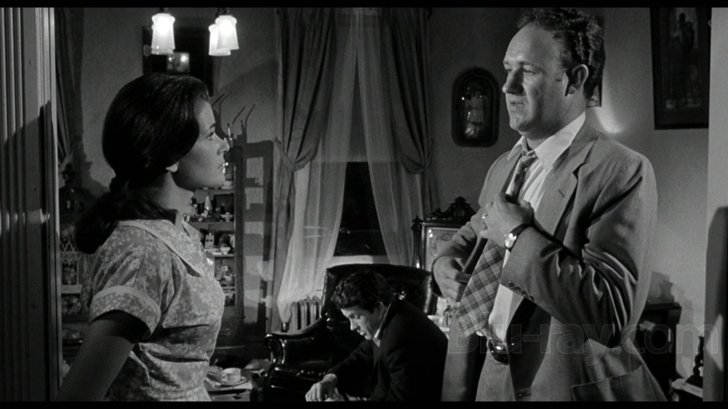
Lilith's 1080p, AVC-encoded Blu-ray presentation is by far the weakest I have seen from Mill Creek, and it's considerably worse than that of the accompanying Ship of Fools, despite having a higher bitrate (19.10 vs. 15.00 Mbps), which just goes to show that numbers aren't everything. Plagued by weak detail and frequent video noise, the film's B&W cinematography by Eugen Schüfftan, an Oscar winner for The Hustler, is deprived of the clarity necessary for a sense of depth. The copious noise (which may not be obvious in still screenshots) interferes with the delineation of fine shades of black, white and grey, robbing images of their texture. The likely culprit here is an older transfer performed with less-than-ideal elements; even with the same elements, a new scan with current equipment would probably produce better results. Some degree of digital manipulation is also at fault, because the grain pattern does not show the natural movement of film grain. Instead it jumps back and forth in the jarring pattern of what has sometimes been called "hanging grain". I have seen claims of "DNR" applied to this transfer, but that is clearly the wrong criticism. If noise reduction had been applied, there wouldn't be so much noise. The problem is a poor image capture and, probably, some electronic sharpening in an effort to overcome its limitations.
Lilith Blu-ray Movie, Audio Quality 
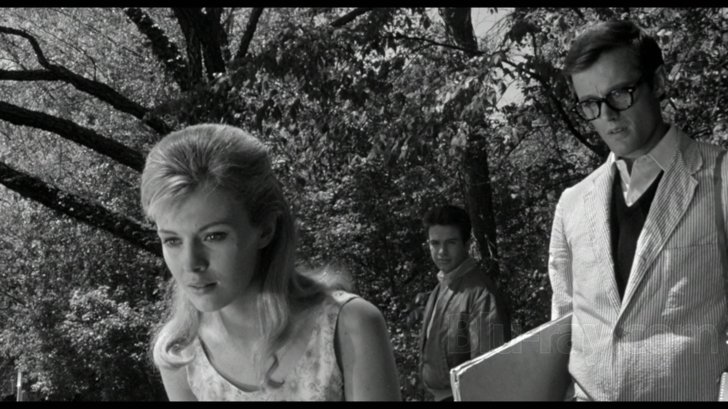
The film's original mono soundtrack is presented on the disc as DTS-HD MA 2.0, and it's certainly adequate. Voices and effects are properly balanced, and the dynamic range for such elements as galloping horses and rushing rivers is surprisingly broad. The Hustler's composer, Kenyon Hopkins, provided the incongruously upbeat score.
Lilith Blu-ray Movie, Special Features and Extras 
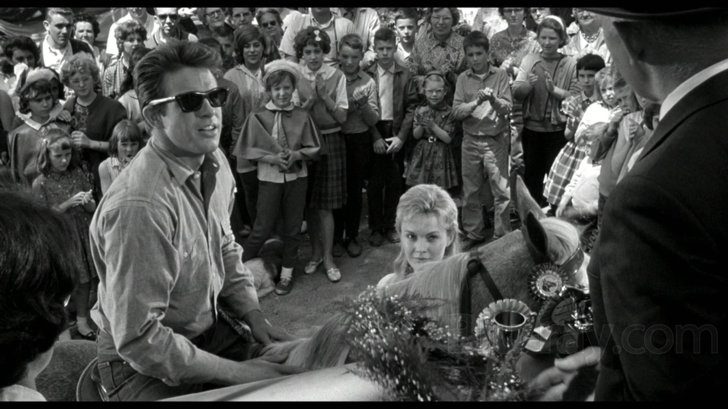
No extras are included. Sony's 2004 DVD also provided no extras.
Lilith Blu-ray Movie, Overall Score and Recommendation 
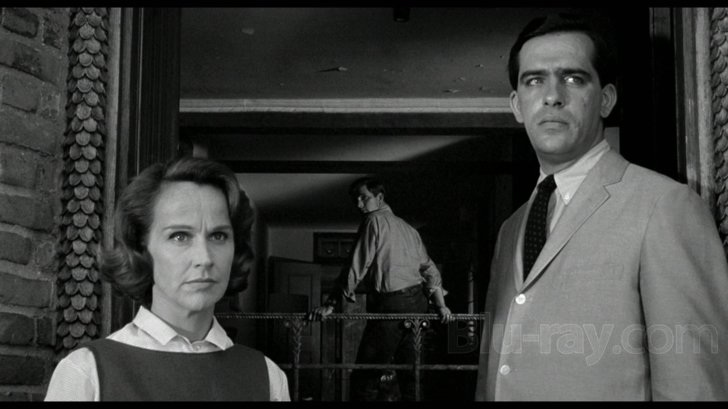
I doubt that Lilith will ever be anything other than a cult film, a curiosity known primarily to fans of Rossen or Seberg. For that reason, unfortunately, this Blu-ray version from Mill Creek is unlikely to be supplanted anytime in the near future. It isn't unwatchable, but it's far from the best of which Sony (which provided the master to Mill Creek) and Blu-ray are capable. I am not offering a recommendation, but simply presenting my observations.
Similar titles
Similar titles you might also like
(Still not reliable for this title)

Ship of Fools
1965

Moonlight 4K
2016

Antichrist
2009

The Club
El Club
2015

The Ice Storm
1997

Europe '51
Europa '51 / The Greatest Love
1952

A Taste of Honey
1961

Novitiate
2017

Fat Girl
À ma sœur!
2001

Indignation
2016

Still Alice
2014

Rapture
Limited Edition to 3000 - SOLD OUT
1965

Life During Wartime
2009

The Celluloid Closet 4K
1996

The Man Who Fell to Earth
Limited Collector's Edition
1976

Nymphomaniac: Volume II
2013

Kumiko, the Treasure Hunter
2014

A Night to Remember
1958

Her Smell
2018

Nymphomaniac: Volume I
2013